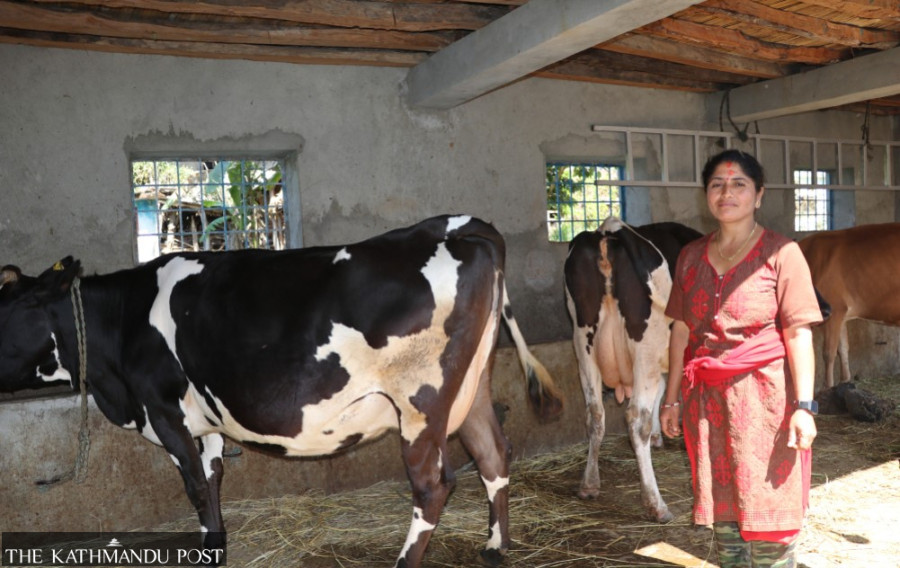Money
Women farmers convince husbands to quit foreign jobs
Several women entrepreneurs in Gulmi have encouraged their husbands to take up professions they once deemed unworthy.
Gaganshila Khadka
Laxmi Bhandari used to earn enough to maintain her family’s livelihood by raising two cows in Hansara, ward-5 of Satyawati Rural Municipality in Gulmi district.
Her husband used to work abroad and save his earnings.
The couple had been making a handsome income.
However, with the increasing workload and responsibility of managing the household and with two young children and an ageing mother-in-law, Bhandari felt burdened.
She, however, was confused about whether to ask her husband to return home, which would mean sacrificing the monthly savings.
Despite the risks, she decided to buy more cows. As a result, her income has risen. Laxmi now owns 13 cows and has set up Shubhlakshmi Cow Farm.
It has been two years since her husband, Yagya Murti (Laxman) Bhandari, returned home.
He now helps his wife.
"When I used to earn Rs25,000 a month, my husband’s income was Rs150,000,” said Laxmi. “I was in a big dilemma whether to call him [Laxman] back home. We stood to lose a huge amount of money.”
But Laxmi's dedication paid off. “I make Rs120,000 a month by selling 60-70 litres of milk daily,” said Laxmi, 37.
“Most importantly, I have my husband’s support.”
Laxman is not the sole example of someone who has returned home by quitting their jobs abroad.
Homnath Dhakal, from Neta in ward-5 of Satyawati, also returned to his village and joined his wife’s commercial vegetable farming.
With little arable land and limited sources of earnings, Homnath had no choice but to go abroad to manage household expenses.
But his hopes of making a high income abroad failed.
His wife Laxmi Dhakal started vegetable farming mainly to pay for her son’s education.
“Initially, it was difficult,” said Laxmi Dhakal. “Now, our farm’s output has increased.”
She is among the successful vegetable farmers in the area. Homnath, who has returned home, has been assisting her.
The Dhakal couple has 8 ropani [1 acre] of land, where they grow a variety of vegetables.
They also have 25 goats.
The Dhakals are also entrepreneurs as they sell their produce by themselves.
"Our options for work are limited abroad. If we can find something profitable in our own country, that’s the best option,” said Dhakal.
Low productivity, lack of market access and poor profit in the farm sector have forced youth to seek jobs on foreign shores.
According to the agriculture census report of the National Statistics Office, formally, the Central Bureau of Statistics, an increasing number of female-headed households are emerging in Nepal as a result of economic downturns and mass exodus of males to foreign lands.
In 2011-12, female-headed households in Nepal, in which an adult female became the sole or main income producer and decision-maker, were just 19 percent.
After 10 years, according to the census report, female-headed holdings nearly doubled to 32.4 percent. This means 1.33 million women head households in Nepal.
Motimaya Sijapati, from Thulolumpek in ward 3 of Satyawati, is another commercial farmer who convinced her husband to return home with her initiative.
She transformed her two-decade-long family’s traditional buffalo rearing into a commercial venture.
Her husband too supports her.
Motimaya and her husband Janak are engaged in commercial raising of buffalo, goat, and poultry. They also operate a ‘fresh house’ (a butcher shop) in the village, and sell milk.
These are the success stories of how entrepreneurship has transformed villages in Satyawati—something rare in Nepal’s context.
People nowadays aspire to the comforts of living in the city or abroad with a stable job.
Villagers say that Gulmi, a tiny hill district in western Nepal popular for coffee farms, now has several successful women entrepreneurs. These women have lured back their husbands into the same professions they once thought were not worthy.
Besides coffee, dairy and poultry farms are thriving in the villages.
Agricultural experts and technicians at the local level also provide assistance and advisory services to farmers and help solve disease-related problems.
In the villages, there are now dairies. “We have a local market for our produce,” said Dhakal.
In Thulolumpek, the Sijapati couple doesn't face any shortage of market.
"We sell chickens and goats in the village," says Motimaya. "We also get orders for ducks and goats from Syangja, Palpa, and Baglung."
The women entrepreneurs want to grow more.
Traditionally, Nepal lacks a value chain in the farm sector. “We are now learning from the Indian farmers on off-season farming,” said Homnath Dhaka. “The profit doubles if you grow seasonal vegetables.”
The internet has proven to be a boon. “We are learning new techniques of commercial farming from YouTube channels. As our local agricultural extension services are not sufficient, we have to keep up with the times.”
Farmers in Gulmi don’t want to fall behind in adopting modern farming practices.
From the vegetable farm alone, the Dhakal couple makes a net savings of over Rs50,000 a month.
The couple also produces honey. “One of our relatives exports honey to Thailand.” In the first year, we produced 30 kilograms, and the production will gradually increase, said the couple.
"I faced many difficulties abroad. There was a lot of health risk due to technical work. Even when I was sick, I couldn't take leave to come home,” said Homnath. "No matter how hard you work abroad, it doesn't benefit you personally.”
“I have come to realise that if you are ready to work twice as hard here, you can double or even triple your income compared to working abroad."




 22°C Kathmandu
22°C Kathmandu














